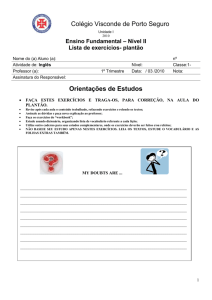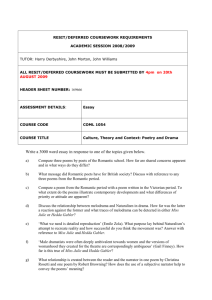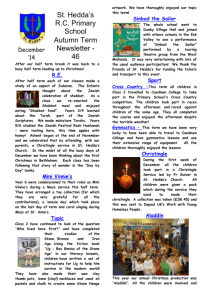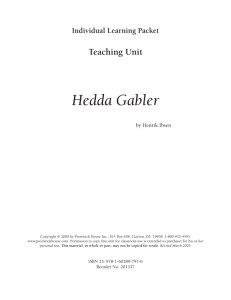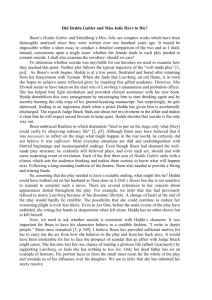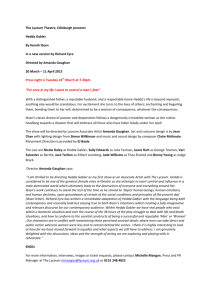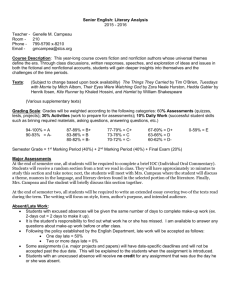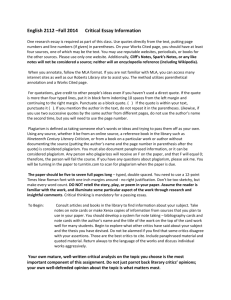Hedda Gabler_Characters
advertisement
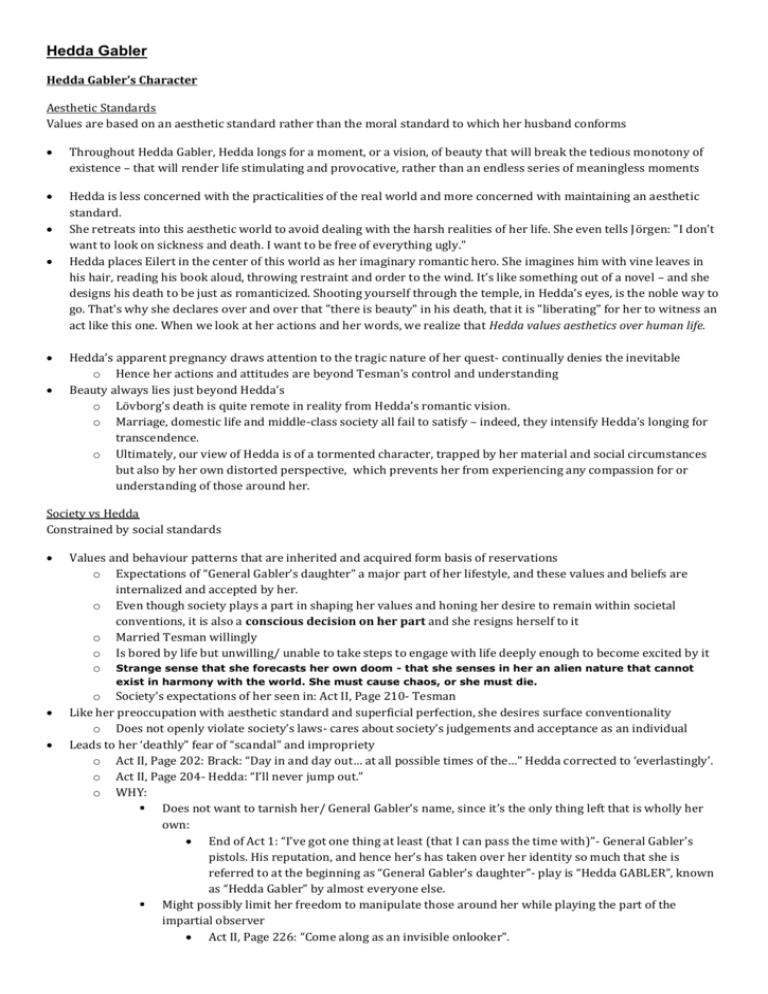
Hedda Gabler Hedda Gabler’s Character Aesthetic Standards Values are based on an aesthetic standard rather than the moral standard to which her husband conforms Throughout Hedda Gabler, Hedda longs for a moment, or a vision, of beauty that will break the tedious monotony of existence – that will render life stimulating and provocative, rather than an endless series of meaningless moments Hedda is less concerned with the practicalities of the real world and more concerned with maintaining an aesthetic standard. She retreats into this aesthetic world to avoid dealing with the harsh realities of her life. She even tells Jörgen: "I don’t want to look on sickness and death. I want to be free of everything ugly." Hedda places Eilert in the center of this world as her imaginary romantic hero. She imagines him with vine leaves in his hair, reading his book aloud, throwing restraint and order to the wind. It’s like something out of a novel – and she designs his death to be just as romanticized. Shooting yourself through the temple, in Hedda’s eyes, is the noble way to go. That’s why she declares over and over that "there is beauty" in his death, that it is "liberating" for her to witness an act like this one. When we look at her actions and her words, we realize that Hedda values aesthetics over human life. Hedda’s apparent pregnancy draws attention to the tragic nature of her quest- continually denies the inevitable o Hence her actions and attitudes are beyond Tesman’s control and understanding Beauty always lies just beyond Hedda’s o Lövborg’s death is quite remote in reality from Hedda’s romantic vision. o Marriage, domestic life and middle-class society all fail to satisfy – indeed, they intensify Hedda’s longing for transcendence. o Ultimately, our view of Hedda is of a tormented character, trapped by her material and social circumstances but also by her own distorted perspective, which prevents her from experiencing any compassion for or understanding of those around her. Society vs Hedda Constrained by social standards Values and behaviour patterns that are inherited and acquired form basis of reservations o Expectations of “General Gabler’s daughter” a major part of her lifestyle, and these values and beliefs are internalized and accepted by her. o Even though society plays a part in shaping her values and honing her desire to remain within societal conventions, it is also a conscious decision on her part and she resigns herself to it o Married Tesman willingly o Is bored by life but unwilling/ unable to take steps to engage with life deeply enough to become excited by it o Strange sense that she forecasts her own doom - that she senses in her an alien nature that cannot exist in harmony with the world. She must cause chaos, or she must die. o Society’s expectations of her seen in: Act II, Page 210- Tesman Like her preoccupation with aesthetic standard and superficial perfection, she desires surface conventionality o Does not openly violate society’s laws- cares about society’s judgements and acceptance as an individual Leads to her ‘deathly” fear of “scandal” and impropriety o Act II, Page 202: Brack: “Day in and day out… at all possible times of the…” Hedda corrected to ‘everlastingly’. o Act II, Page 204- Hedda: “I’ll never jump out.” o WHY: Does not want to tarnish her/ General Gabler’s name, since it’s the only thing left that is wholly her own: End of Act 1: “I’ve got one thing at least (that I can pass the time with)”- General Gabler’s pistols. His reputation, and hence her’s has taken over her identity so much that she is referred to at the beginning as “General Gabler’s daughter”- play is “Hedda GABLER”, known as “Hedda Gabler” by almost everyone else. Might possibly limit her freedom to manipulate those around her while playing the part of the impartial observer Act II, Page 226: “Come along as an invisible onlooker”. o Driving force behind her behaviour in the play (e.g.: breaking things off with Ejlert, marriage with Tesman) Manages to restrain herself after every outburst- remains a prisoner to “Victorian values” o Act I, Page 179- Hedda: “Raises her arms and clenches her fists as though in a frenzy.” “Calm and collected once more.” Recognizes situation, and hates herself for her conformist actions. o Calls herself a "coward" because she isn’t willing to break the rules o Still trapped inside that parlor room when she kills herself- dies in the inner room, behind a closed curtain? However, she is still able to bend society’s rules and express herself (however indirectly) herself Rejects roles expected of women (motherhood) o Defying role of mother and wife Reacts angrily or defensively, or simply ignores references towards her undertaking an additional role of a mother Act II, Page 209- Hedda: “Be quiet! You’ll never see anything of the sort!” ““I’ve no aptitude for any such thing, Mr Brack. No responsibilities for me, thank you!” “Why shouldn’t you, like most other women, have a natural aptitude for a vocation that…?” Destructive inclination towards the brain-child of Thea and Lovborg In sharp contrast, Thea and Lovborg prize their ‘child’ so highly that they would go to great lengths to save it. It is the ultimate manifestation of their relationship together, and it is a precious thing to them both. Thus, when Lovborg loses the manuscript, he is fraught with despair: “Look, Hedda, suppose a man... in the early hours of the morning... came home to his child’s mother after a wild and senseless debauch... I’ve lost him. Just like that.” When Hedda eventually burns the manuscript, claiming with an intent sort of pleasure that she is “burning, burning your [Thea’s] child,” it can be inferred that she is perhaps resentful of this relationship, this maternal inclination of Thea society so approves of--while she strains against its expectations, she also fears scandal, and envies those who are able to find contentment within them. Plays unconventional part in marriage/ behaviour is still unconventional in itself o Dominant partner of marriage o No use of love ‘that sickening word’ Seeks outlet to express herself which neither class nor society allows women to Vicariously gained sexual knowledge without any damage to her reputation or loss of control over her life Impacts of repression o Act III, Page 206:-Hedda: “These things suddenly come over me. And then I can’t resist them.” Rejection of Femininity With Thea as a foil as an epitome of femininity, Hedda seems to be decidedly less feminine in contrast, or at least less conventionally feminine o Less hair, “thin” (Thea: Uncommonly wavy and thick) o Does not want children, idea of destruction/ death whenever topic comes up (Thea: Contributes to act of creation through Ejlert Lovborg’s manuscript) Perhaps, it is also because Hedda was brought up to be man? “The way was used to having things in the General’s time. Do you remember he riding along the road with her father? In that long black habit? And with a feather in her hat?” She was allowed to ride beside her father, which is symbolic of her father’s treatment of her not as a “lady” but more of a son he could bring along on his riding trips. Power Struggle Wants to exert and influence over another person When Mrs. Elvsted wants to know why she’s manipulating Eilert like this, her answer is: "For once in my life, I want to have power over a human being." She considers Thea "rich" for her influence and herself "poor" for the lack of it. Due to the fact that she is so constrained by her society and is thusly governed and controlled by it, she manipulates others so as to feel in control of something else. Conflicted Identity Has a conflicted identity- does not know what to do with herself In contrast to the men in the play, who are defined by their occupations, Hedda has no occupation to speak of. Bored to death” Lives through others "Do you find it so very surprising that a young girl [would] like some glimpse of a world that […] she’s forbidden to know anything about?" Hedda’s explanation for her friendship with Eilert in the past. She couldn’t go out in the world, become an alcoholic, and sever ties with her aristocratic family. But that’s what Eilert was doing. Hedda got as close to the renegade lifestyle as she could by listening to him talk about it. When she devises the perfect suicide for Eilert, she’s continuing in this vein – orchestrating the life that she can’t experience herself. Manipulative Design/ Plan interactions with characters in order to achieve a certain goal o Act I: Hedda makes it a point to comment on the ugliness of the hat on the chair, which she states that she believes is the maid's. When Aunt Julia claims the hat as her own, Hedda does little to retract her statement. Later, however, we find out that Hedda in fact manufactured the whole event, knowing quite well that the hat was Aunt Julia's all along. o Can fake friendship in return for information (Thea, Act I) Fabricate motives (Burning of Manuscript, Act 2) Conceal emotions (Suppressed rage, Act 1) Ability to extract information o She’s very skilled at asking questions without ever answering any herself. Eilert says it best: "I used to make [confessions] – telling you things about myself that no one else knew." When he asks her what "power" in her made him do so, she replies: "You think it was some kind of power in me?" Notice how she counters his question with another? Hedda’s Role in the Play Victim, Tool or Perpetrator? Vital to repeatedly consider to Hedda’s role in the ensuing mini-tragedies o Victim Simply a player in a larger design o Tool A plague being delivered onto this small community o Perpetrator Playing God, and dictating all of the events that take place? Readers have a continued refusal to wholly implicate her as the villain o Personal refusal to abandon sympathies for her in Act I especially, curiosity as to what Hedda is planning Hedda Gabler’s Relationship with Tesman Subverted Gender Roles in the Relationship of Hedda and Tesman Dominates Relationship o Act 1, Page 169: when Aunt Julle had asked Berte if they will be coming in here everyday, Berte said “That’s what it sounded like. The lady, that is. As for himself… the doctor… he didn’t say anything.” Hedda asserts herself from the very beginning of the play BUT Tesman was still gleeful of being with Hedda Gabler o Aunt Julle: And to think that you’d be the one to walk off with Hedda Gabler! The lovely Hedda Gabler. Imagine it! So many admirers she always had around her! Imbalanced Relationship On societal levels On personal levels o Tesman is extremely eager to please Hedda Offers to buy her a new piano at the mention when she comments on her own piano’s age and mistmatch. “I was just looking at my old piano.It doesn’t go with the rest of the things.” “As soon as I get my first cheque, we’ll see about getting it changed.” H: “pathetically eager to be allowed to support me” “it’s such fun to wait on you Hedda” while Hedda is unhappy to have to settle for such a marriage. Marriage with weak foundation Very basis of their relationship - Lady Falk’s house - is later revealed to be something that they did not have in common after all (“Yes, it has a sort of odour of death. Like a bouquet the day after a ball”), leading the reader to ask, what exactly is this marriage based on? o Because the marriage has no foundation, no reason to continue, it seems inevitable that it must meet its sad and tragic end. Their “agreement” to entertain and for Hedda to have a saddle horse and footman or something- contractual rather than based on that Glutinous Word Marriage of Convenience Tesman was the only man around willing to do it [“I’d really danced myself tired, my dear sir. I had had my day...”] Hedda married Tesman because she felt he could provide her with economic safety, so when his job is threatened she continues to demand Hedda only married Tesman because it was the socially acceptable thing to do; obviously incompatible with her, shows her inherent fear of scandal despite her the fact that she would put herself in a loveless marriage, with a partner so conflicting wish to break free of said fear. Convenience, though, seems too fleeting/insubstantial a reason to enter marriage--when compared with Thea/Lovborg, the mutual care and love they have for each other makes the Hedda/Tesman marriage seem all the more shaky. Hedda’s Relationship with Ejlert Lovborg Hedda may love Lovborg, but we can’t be sure. What she definitely loves is the idea of him - a person who is strong enough to resist the demands and expectations of society. o We see Hedda romanticizing the idea of Lovborg with “vine leaves in his hair” and she seems to suffer no real grief / guilt upon hearing of his death (her only question is to ask whether or not he had died a beautiful death, in sharp contrast to Thea’s hysterical demands to see him). o While we see Hedda protecting Lovborg’s death at the end (“There is always the possibility that the pistol was stolen.” “I’d sooner die!”), this does not mean that she has grown to love him; rather, it is simply in keeping with Hedda’s aesthetic values, as she would not want the beauty of Lovborg’s death to be tainted with scandal. o Lovborg’s death is, to Hedda, the final blow that shatters her world of such aesthetic values--”does everything I touch turn vile and ugly?” Hedda is disillusioned, exasperated and frustrated- her carefully orchestrated game of manipulation has resulted in the exact opposite of what she had hoped for. Judge Brack Man of action o Makes things happen- has power o E.g.: Helped Aunt Julie arrange to put up the money for a security deposit, helped George with the finances involved in buying the "dream" house, brings news with regard to George getting the post as professor, which he promises will still go through. Intelligent/ Cunning/ Sly o Intuitive- picks up information that isn’t explicit Just as Hedda recognizes Thea’s relationship with Eilert before it’s admitted, so the Judge is able to guess at Hedda’s past relationship with the same man. o Like Hedda, he feels out a situation for information before revealing his hand – you can see a great example of this in Act IV when he arrives with news of Eilert’s "suicide." Only character to have power over Hedda o Only character that Hedda is honest with Jörgen Tesman Along with the other Tesmans (his aunts and Berte), they form a whole and a unity- have a common way of thinking; common memories, and a common attitude to life. For Hedda they appear as an inimical and alien power directed against her fundamental nature. Unsuited for Hedda o Obvious from the beginning that he is of an inferior class to Hedda + Unsuited for Hedda o When Tesman remarks that "It would never have occurred to [him] to write about anything like that," Hedda pointedly replies, "Of course not." George doesn’t create; he can only immerse himself in other people’s work. o Adherence to rules- Makes a big deal out of Hedda having a chaperone if she’s going to sit with Eilert. In Act IV, when he first hears that Hedda has burned the manuscript, his response is, "It’s illegal disposition of lost property!" Is inward rather than outward looking o The goal of the project with Thea at the end to recreate Lovborg’s work is entirely consistent with Tesman’s world view: he prefers to consolidate and preserve an object from the past rather than create something entirely new and unpredictable in the future. o In this way, the narrowness of Tesman’s outlook – which is also, by extension, that of the social class whose values he exemplifies – is exposed: its focus is inward rather than outward; it attends methodically to the fine details, but lacks the vision to comprehensively grasp the wider picture. Ejlert Lövborg Comes from wealthy, aristocratic family- same level as Hedda and Brack Wants to control the world, but cannot control himself- instead, is influenced by Hedda and Thea o Hedda and Thea aren’t two jealous women fighting over who gets to have Eilert; they’re fighting over which man Eilert will be. As Hedda puts it, they’re fighting for "control" of his "destiny” and the values he will subsequently represent. o Hedda likes Eilert as an alcoholic Sees him as a symbol of freedom, and relishes what she sees as his complete break from societal norms. Likes the idea that, for all the repression and restrictions of society, Ejlert is able to break free from the constraints of his class and society. Eilert is even cavalier about money – he won’t compete for the professorship because he "only wants to win in the eyes of the world." Hedda is all about this renegade character. o Thea, on the other hand, is a totally different story. She likes Eilert as a reformed man – a scholar, a writer, and a teacher. Thea manages to reform Lovborg from his wild ways. He appears to be accepting of this new self as better, and even tries to resist Hedda’s goading into drinking wine/making merry However, Hedda manipulates Lovborg out of sheer spite and a desire to establish her influence as dominant over Thea’s, revealing once again her manipulative nature. Hedda shows Lovborg the inadequacy of this ‘new self’--- he’s not a Real Man; he’s relegated to taking tea with the women rather than making merry with Tesman and Brack Caught in between o Hedda and Thea, aristocracy and life as an outcast, scholarly fame and shameful disrepute, drinking and not drinking, courage and cowardice. o His role in Hedda Gabler revolves around the tension of being in between – the pressure to move in one direction or another Thea Elvsted, nee Rysing Courageous Mrs. Elvsted is courageous (in Ejlert’s eyes and in Hedda’s) (though Hedda loathes to admit it) The fact that Thea, a character fully in line with society’s expectations of a typical female, as well as one Hedda views as inferior to her, should possess this courage affects Hedda deeply. o She runs away from her husband who is, in her words, “keeping her only because she’s useful and cheap”, o o o o "God knows [people] will say what they please," she says. "I only did what I had to do." Shocking in the 1890s- is something unheard of and scandal causing. After this episode, she can no longer return to her home “up there”, and she accepts the consequence. She runs to Ejlert; she is devoted to being his muse and she follows him when she has nowhere else to go. In fact, she is unafraid to being with him. → in Ejlert’s words, she has “infinite courage...for her companion”. Mrs. Elvsted says "to hell with the rules" the same way that Eilert used to back in his alcoholic days. It’s odd that Hedda doesn’t recognize this – or perhaps she does, subconsciously, which is potentially a third reason for her to dislike this woman. Creation Mrs. Elvsted is genuinely devoted to creating things. Case in point, her love-child-book with Ejlert Lovborg. Contrast to Hedda, as Hedda is most concerned with her aesthetic ideal and, often, in manipulating and (frankly) destroying those around her so as to fit them into her ideals. Hedda also loathes things that should usually speak of life → BABY. She loathes this form of new life perhaps because it means death to her, to be further constrained and restricted o Also, Hedda’s main prop is her pistols, definitely a killing sort of thing. Conventionally Feminine Feminine in terms of appearances- has wavy, uncommonly thick hair o Perfect picture of a Victorian housewife o Hedda is neither truly feminine nor truly masculine. Having grown up living vicariously through men, and wishing to embody men, she cannot truly be the devoted maternal, feminine figure that Thea manages to be. Hedda’s obsession with Thea’s hair, arguably the symbol of her womanly ways. Hedda refers in Act I to Thea’s "irritating hair that she was always showing off." Ibsen’s stage directions note that it is "remarkably light, almost a white-gold, and unusually abundant and wavy." Allows Hedda’s first moment of insecurity when Thea sits with Tesman- wondering if Thea, the ultimate woman will do for George what Hedda herself cannot. o Devotion to another Struggles with the same question as Hedda and Miss Tesman: to what or whom can she possible devote her life? e.g. she is devoted to Ejlert, having followed him and been beside him through his reformation from being a debauched drunkard. After Ejlert’s death, she smoothly slips in next to Jörgen, and proves (in a few lines) to Hedda that she’s far more feminine and womanly and WHAT JORGEN NEEDS (End Act 4 → Hedda: Is there nothing I can do to help you two? Jorgen: No...nothing at all!) Mrs. Elvsted has power over Ejlert o Mrs. Elvsted: “I have a certain power over him.” o She manages to reform him from being a raving alcoholic, change him into a proper upright man who writes and is an intellectual. She also manages to be the beacon of righteousness and uprightness when he is slipping towards Hedda; he tries his best to stop his old ways. o Hedda hates her for this. “Oh if you could only understand how poor I am,. And fate has made you so rich!” Act 2; end. Relationship between Thea and Lovborg Have a happy, normal relationship of sorts! Both parties are not equals, as is the case with Hedda and Tesman, where Thea is seen as the muse assisting Lovborg with his book- to her, it seems like a miracle that he would need her at all, and she responds with adoring dedication. However, despite this, they differ from Hedda/Tesman because they both seem content with the arrangement on the surface! Thea tries to domesticate Lovborg--he initially tries to stay within these norms, but later bursts out that she has “broken his courage, his defiance”
